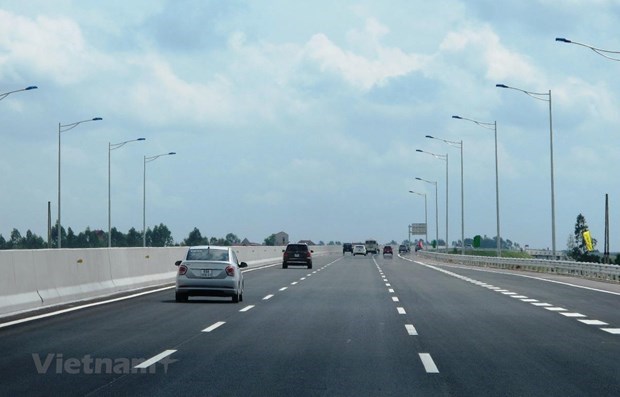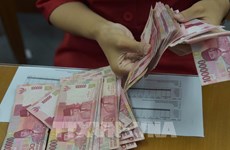Investment in transport key to Vietnam’s economic growth: US magazine
The 2,109km–long North-South Expressway project, worth 5 billion USD, will revolutionise the Vietnamese transportation network by connecting the entire country for the first time in its history, according the US-based Borgen Magazine.
 Vehicles move on an expressway in Vietnam (Photo: VietnamPlus)
Vehicles move on an expressway in Vietnam (Photo: VietnamPlus)The April 6 article, titled “Developing Vietnam’s Transportation Infrastructure”, wrote that since the 1986 economic reforms were launched at the sixth national congress of the Communist Party of Vietnam (CPV), the country has experienced incredible economic growth.
Over three decades, new economic policies, meant to prioritise the market, resulted in both an explosion of economic activity and a slash in the poverty rate. However, Vietnam’s transportation infrastructure is still woefully behind many other developed economies.
These reforms resulted in a massive cut to poverty across the country. Vietnam has transformed from one of the world’s poorest countries to a lower-middle-income country with its sights set on upper-middle-income status.
Improving travel networks will better connect consumers with producers and decrease the transportation costs for moving products and resources by increasing the efficiency of transporting them. Additionally, developing transportation infrastructure directly affects those who suffer from poverty by better connecting areas with little economic opportunity to vital economic centres, Borgen noted.
It said the Vietnamese Government has responded to this need by creating a nationwide connectivity project, the North - South Expressway. The North - South Expressway is a project that was first conceived in 2010 but only began construction in 2019.
The 5 billion USD project covers the country at 2,109 kilometres of road, more than doubling the 1,000 kilometres of current Vietnamese highways. This project looks to directly connect 32 provinces in Vietnam from the mountainous northern province of Lang Son to the southern province of Ca Mau. This project will revolutionise the Vietnamese transportation network by connecting the entire country for the first time in its history. The government, therefore, considers it a “national priority”, according to the magazine.
The North - South Expressway project has just had its first phase with the total length of 654 kilometres implemented.
Minister of Transport Nguyen Van The said his ministry will submit the second phase to the Government and the National Assembly for approval so as to complete the entire route soon.
Among the 11 sub-projects of this projects, three funded with public investment capital (Cao Bo - Mai Son, Cam Lo - La Son, and My Thuan 2 Bridge) are currently under construction and able to be completed this year as scheduled.
Eight other sub-projects were set to be invested in the public - private partnership (PPP) format or put out to international bidding.
Due to certain difficulties, the National Assembly agreed to convert three of these eight sub-projects into public investment ones, namely Mai Son - National Highway 45, Vinh Hao - Phan Thiet, and Phan Thiet - Dau Giay.
Meanwhile, two of the five remaining PPP sub-projects, National Highway 45 - Nghi Son and Nghi Son - Dien Chau, failed to seek investors. Therefore, the Government also proposed the National Assembly Standing Committee consider transforming these two sub-projects into public investment ones.
Borgen said beginning next year, the recently passed Public-Private Partnership Law (PPPL) will come into effect, strengthening the Vietnamese legal framework for PPP projects. The law will clarify the process of investing in Vietnam by creating standard form contracts, government guarantees to fulfil its end of the project and for foreign investors to pay investments in the proper foreign currency and a risk-sharing mechanism.
Vietnam is at a crossroads in its development and requires investment in its transportation network to sustain and expand its growth. Although they have run into trouble financing the North-South Expressway, the implementation of the PPPL aspires to fix this problem by making PPPs in infrastructure projects simpler and more attractive, the magazine added./.











